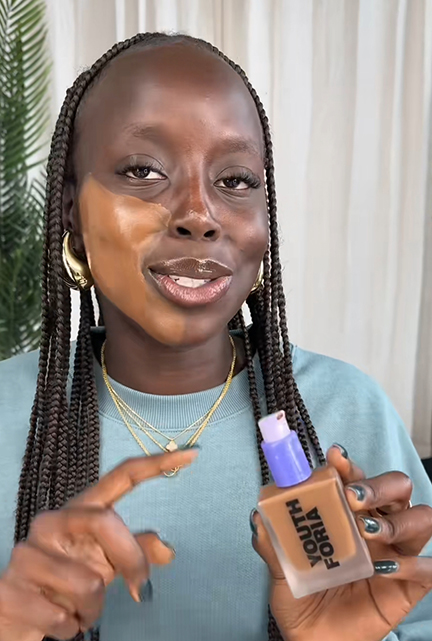By Logan Langlois
NASHVILLE, TN — “I’ve loved the beauty industry, I’ve always wanted to be a part of the beauty industry, but I didn’t feel like they love me back,” said Christina Abiola, a popular makeup influencer and reviewer on the social media app TikTok. This has been the overall sentiment of the Black makeup community following the release of popular makeup brand Youthforia’s release of the highly-anticipate recent beauty line Date Night Skin Tint Serum Foundation. At the reveal of the foundation’s shade range, only 15 shades were made publicly available, and of those only three were found to work on Black skin tones, none of which would work on darker shades of Black skin.
Excitement for the line’s release was palpable, as the product claimed to be a revolutionary venture that was nothing short of a stepping-stone in changing the way makeup could be worn. The brand first did a wonderful job of taking viewers on a journey of how Date Night Skin Tent Serum Foundation was made. Expectations were set high as Youthforia claimed this foundation wouldn’t just serve as makeup, but also skincare.
Youthforia claimed that this would be the first foundation to hit the market that customers could sleep in without having any adverse reactions to their skin. Being a smaller makeup brand, it wasn’t uncommon for companies like Youthforia to only release 15 shades of such a daring venture to see how the line performed on the market before committing any more financial investment. What soured the celebration for many was that while the first 15 seemed to have plenty of options for light and medium skin tones, darker skin tones seemed to have been largely forgotten.
Following the release, it didn’t take long for customers to begin speaking out against Youthforia regarding what they saw as a lack of racial inclusion and colorism. Many dark-skinned influencers and Black women on TikTok largely began trying on the three shades available to the Black community, only to publicly find out how non-inclusive the brand was by how poorly the foundation blended with their skin tone. After the online backlash, Youthforia quickly announced they planned on releasing more shades in the future after evaluating the initial rollout.
The logic of Youthforias’ first response was full of blemishes for fans however, as many who had been following the making of the foundation were quick to point out the brand had been boasting an unlimited budget for the project. Despite the budget, critics voiced that the brand had failed to put an effort into their foundation’s initial rollout to make Black consumers feel seen, a point that inspired even more anger when it was further shown by critics that Youthforia was using pictures of Black women on their website to advertise the foundation line in question.
The failure of inclusion spurred bleak conversion online regarding the longstanding history of beauty brands releasing darker complexions of products only after the lighter complexions had been proven to sell. For many Black women, the practice has always made them feel like second place within the beauty industry, an afterthought of mainstream product lines rather than a primary market base. Comments flooded with Black women discussing having a generally harder time finding products that work with their skin tone, and the general lack of diversity within beauty products available for the Black community. Many of them wondered when the beauty industry would finally show itself to be as inclusive as it’s advertised to be.Beauty Brand Botches Rollout


